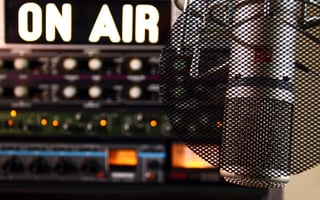We've reached day four of our guide to the spokespeople and interviews that stood out for the right...
Repeated threats to end the interview early.
Telling the journalists what they should and should not ask about.
And accusing the presenter of not being a journalist.
These are just some of the many remarkable moments that came during an extraordinary radio interview.
Not got time to keep reading? Listen to the blog instead
Sebastian Gorka, Donald Trump’s senior director for counter terrorism, appeared on Radio Four’s the World At One programme to discuss Gaza and the US President’s Trump to the Middle East.
The interview, which you can hear here at around 13:30 for as long as the broadcaster makes it available, got off to a difficult start and proceeded to go rapidly downhill.
The opening question asked him about UN Relief and Works Agency (UNRWA) criticism of Israel and two months of food being blocked from getting into the territory.
Mr Gorka began by calling UNRWA “Utterly morally corrupt” and claimed that Israel has allowed a “gargantuan amount of food” into Gaza.
Asked if there would be “a problem with baby formula going into Gaza”, he replied: “I’m not going to talk about this. It’s garbage, it’s rubbish.”
And at this point the anger began to become increasingly obvious.
As journalist Sarah Montague tried to ask another question, he said: “You’re interrupting me again. I will terminate this interview, OK? If you persist in talking about fake news about starvation in Gaza we are done, we are finished.”
"You do think it's fake? The starvation?@Sarah_Montague asks Sebastian Gorka, Deputy Assistant to President Trump and Senior Director for Counterterrorism, after Unrwa boss says Israel denying food to Gaza is a 'weapon of war'.
— The World at One (@BBCWorldatOne) May 13, 2025
#BBCWato
And he went on to accuse her of repeating “state propaganda” and suggested he should be asked about “the incredible things President Trump is doing in the Middle East.”
A memorable interview – for all the wrong reasons – still had one dramatic twist.
When Ms Montague asked about the president’s willingness to accept a $400 million luxury jet from Qatar, Mr Gorak accused her of having ‘Trump derangement syndrome’.
He said: “Do you ever have pangs of conscience that you are so utterly and completely biased that all you can do is give in to your Trump derangement syndrome?
“Have you ever once said anything positive about President Trump or not knelt at the altar of left-wing ideology?”
Here’s the rest of that exchange:
Montague: “Is there a response to the question?”
Gorka: “Is there a response to my question?”
Montague: “Well, I’m asking the questions here. We’re more interested in what you have to say.”
Gorka: “You know, I like it when a head of state saves the taxpayer $400m. I like that, especially when Boeing has failed to deliver the new Airforce One for years on end, is behind schedule, and afterwards, the plane is donated to the presidential library.
“Weird how the BBC does not know that. That’s because you are not journalists.”
Extraordinary, excruciating stuff. And arguably more meltdown than media interview.
It’s certainly one of the most aggressive and self-destructive approaches I can recall in the time I’ve compiled these media skills training blogs – you wondered what he was going to say next.
And the use of ‘you’ and ‘your’ language in this instance, makes the aggression feel personal – “Your Trump derangement syndrome”, “Have you ever once said anything positive about President Trump.”
Here’s a key question. If you tuned into the interview and knew nothing about the subject – or tuned in late - where would your sympathies lie?
With the calm, composed and professional journalist?
Or the angry, rude, evasive spokesperson?
Brilliant interview by Sarah Montague with the single rudest and most arrogant of men Sebastian Gorka. First class journalism against all the odds.
— Jacqueline Scott (@Jaqscot) May 13, 2025
#wato
Sebastian Gorka is quite the charmer @bbcradio4 Sue Montague
— johnoldham🎙 (@john_chelt) May 13, 2025
@BBCWorldatOne Sarah Montague deserves a medal for her handling of Sebastian Gorka - quite extraordinary
— John Podmore (@John_Podmore) May 13, 2025
#bbcwato Strange interview with a Trump supporter- Gorka! Sarah Montague was massively professional in the face of very nasty comments. I think the listeners can draw their own conclusions about his behaviour and refusal to answer questions.
— Rob Broomby (@BROOMBY) May 13, 2025
Another question worth asking is what message you think he wanted the audience to take from the interview.
Whatever it was, it became completely lost because of Mr Gorka’s combative, confrontational approach.
We always stress to delegates the importance of composure and remaining calm to delegates on our media training courses, particularly when they find themselves under pressure of facing questions they would prefer not to answer.
That can be tricky if you feel the awkward questions keep coming.
But criticising the questions and the journalist, refusing to discuss particular topics and showing your frustration must be avoided.
It makes interviews memorable for the wrong reasons and distracts from the message.
Not only are they more likely to retain the sympathy of the audience, but showing frustration, annoyance, aggression and insulting the journalist ensures an interview will be memorable for the wrong reasons.
And in the social media age, clips of you getting angry can be quickly shared.
The fascinating thing about this interview is that it was not hostile.
Although Mr Gorka complained about interruptions, I didn’t notice many. But experienced media spokespeople know it happens in most interviews.
The questions were topical and challenging, not negative. And the question about the Qatar donations was an obvious wider issue to bring into the interview considering the attention it has received.
Some of these questions could have been anticipated with good preparation, as we stress during our media skills training courses. And he could have planned how to answer them if they came up.
And in interviews themselves, spokespeople should use bridging to navigate difficult topics.
It helps spokespeople control the conversation and steer it away from difficult questions to what they want to discuss. And when it is used well, the audience won’t even notice.
You need to answer or briefly acknowledge the question and then use a bridging phrase to steer the conversation to safer ground.
We’ve put some bridging phrases together in this blog to help you. But the key to good bridging is for spokespeople to develop their own words and phrases which they feel comfortable with and that work for them.
Such was the nature of Mr Gorka’s approach you have to question the wisdom of him agreeing to be interviewed, especially when he appears to have such a low opinion of the broadcaster.
Turning it down, would have saved him a lot of embarrassment.
But then it also would have prevented us from adding an interview that seemed to break almost every media training rule to our ‘how not to do it’ library.
Media First are media and communications training specialists with nearly 40 years of experience. We have a team of trainers, each with decades of experience working as journalists, presenters, communications coaches and media trainers.
Click here to find out more about our media training.
Subscribe here to be among the first to receive our blogs.




.jpg?height=200&name=zoo%20(1).jpg)

